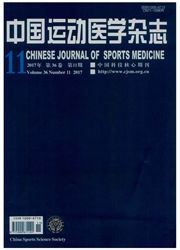

 中文摘要:
中文摘要:
胰岛素样生长因子-I(IGF-1)作为一种生长因子,在骨骼肌损伤后治疗过程中发挥重要的作用。局部注射外源性IGF-1或通过转基因技术使损伤处骨骼肌细胞过表达IGF-1,均能促进损伤骨骼肌再生。IGF-1促进损伤骨骼肌修复的机制可能与如下因素有关:激活骨骼肌卫星细胞,促进成肌细胞增殖与分化,促进蛋白质合成并抑制蛋白分解;抑制骨骼肌炎症反应,并调节巨噬细胞极化;抑制细胞表达胶原蛋白,减少骨骼肌纤维化;作为一种潜在的神经营养因子并口生血管因子,促进损伤后的神经和血管再生。因此,IGF-1在骨骼肌损伤后的治疗中具有重要的应用前景。
 英文摘要:
英文摘要:
As a growth factor, IGF-1 can play an important role in the treatment of skeletal muscle injury. Exogenous local injection of IGF-1 or by transgenic method to make the IGF-1 over expression in skeletal muscle can promote the regeneration of injured skeletal muscle. The mechanism of IGF-1 in skeletal muscle repair may be related to the following factors: activation of skeletal muscle satellite cells, promote the prolif- eration and differentiation of myoblast, promote protein synthesis and inhibit protein decomposition, inhibit skeletal muscle inflammatory reaction, and regulate macrophage polarization, decrease collagen protein ex- pression, and reduce skeletal muscle fibrosis. And as a potential neurotrophic factor and angiogenesis factor, IGF-1 also promote nerve and blood vessel regeneration after injury. IGF-1 has an important clinical applica- tion prospect in the treatment of skeletal muscle injury.
 同期刊论文项目
同期刊论文项目
 同项目期刊论文
同项目期刊论文
 期刊信息
期刊信息
